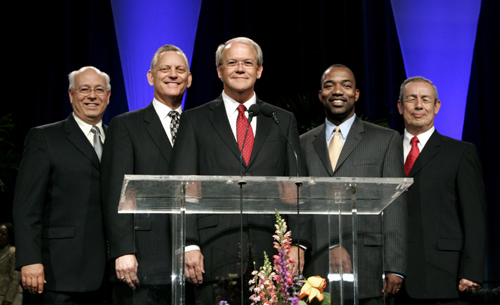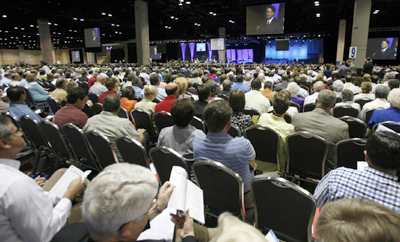Meeting in San Antonio June 12-13, more than 8,500 messengers to the 150th session of the Southern Baptist Convention elected a South Carolinian to a second term as president, agreed upon a definition of the Cooperative Program, and adopted statements on issues of racism, hate crimes legislation, global warming and child abuse.
 Messengers to the 150th annual session of the Southern Baptist Convention elected officers June 12-13 in San Antonio, Tex. From left are John Yeats, interim pastor of Ridge Avenue Baptist Church, West Monroe, La., and communications director for the Louisiana Baptist Convention, recording secretary; Jim Richards, executive director of the Southern Baptists of Texas Convention, first vice president; Frank Page, pastor of First Baptist Church, Taylors, president; Eric Redmond, pastor of Hillcrest Baptist Church, Temple Hills, Md., second vice president; and Jim Wells, director of missions for the Tri-County Baptist Association in southwest Missouri and a member of Hopedale Baptist Church in Ozark, registration secretary.
Messengers to the 150th annual session of the Southern Baptist Convention elected officers June 12-13 in San Antonio, Tex. From left are John Yeats, interim pastor of Ridge Avenue Baptist Church, West Monroe, La., and communications director for the Louisiana Baptist Convention, recording secretary; Jim Richards, executive director of the Southern Baptists of Texas Convention, first vice president; Frank Page, pastor of First Baptist Church, Taylors, president; Eric Redmond, pastor of Hillcrest Baptist Church, Temple Hills, Md., second vice president; and Jim Wells, director of missions for the Tri-County Baptist Association in southwest Missouri and a member of Hopedale Baptist Church in Ozark, registration secretary.Frank Page, senior pastor of First Baptist Church, Taylors, for nearly seven years, was re-elected by acclamation as SBC president. In nominating Page, Dale Morell, a pastor from Brunswick, Maine, praised Page’s heart for smaller churches and his passion for lost persons.
In his president’s address, Page told Southern Baptists that they are at a crossroads, a time of decision-making whether God will continue to use them effectively in worldwide evangelism and missions. Page declared that the only hope is old-fashioned confession and a Holy Ghost revival.
“God has immensely blessed us for a reason – not that we might become spiritually obese, but that we might be a magnificent body of believers across this nation to do a major mission work for him,” Page said, urging Southern Baptists to “beg God for the reviving hand of the Holy Spirit.”
U.S. President George Bush spoke to SBC messengers via satellite link Wednesday morning, commending Southern Baptists for their worldwide humanitarian work and disaster relief efforts, their support of religious liberty, and their commitment to building a “culture of life” in America.
“You’re rising to meet the challenges of broken souls in a broken world with compassion and courage,” Bush said. “You’re living out the call to spread the gospel and proclaim the kingdom of God, and I thank you for your leadership.”
In adopting the 2007-2008 Cooperative Program allocation budget of $200,601,536, messengers also approved a definition of the Cooperative Program, as recommended by the SBC Executive Committee. While not changing current policies regarding CP giving, the definition clarifies that only those funds given through a state convention count as CP contributions.
The definition states: “The Cooperative Program (CP) is Southern Baptists’ unified plan of giving through which cooperative Southern Baptist churches give a percentage of their undesignated receipts in support of their respective state convention and the Southern Baptist Convention missions and ministries.”
In recognition of the 150th anniversary of the Dred Scott Decision, messengers pledged to pray for and eagerly await the day that the scourge and blight of racism is totally eradicated. In the 1857 decision, the Supreme Court ruled that people of African ancestry “had no rights which the white man was bound to respect,” in effect denying their personhood and right of citizenship.
 More than 8,500 messengers gathered June 12 for the two-day 2007 Southern Baptist Convention annual meeting.
More than 8,500 messengers gathered June 12 for the two-day 2007 Southern Baptist Convention annual meeting.Messengers also expressed their disappointment in the members of the U.S. House who passed the Local Law Enforcement Hate Crimes Prevention Act and urged the U.S. Senate to reject the bill, which they feel creates a special protected class of homosexuals and transgendered persons. Meanwhile, they encouraged all believers to love and show compassion toward homosexuals as they seek to share the gospel of Jesus Christ.
Expressing support for the development of environmental public policy that will improve the stewardship of the earth’s resources, messengers urged Southern Baptists to remain environmentally conscious and to take individual and collective actions to reduce pollution, decrease waste and improve the environment.
SBC messengers also renounced individuals, churches, or other religious bodies that cover up, ignore, or otherwise condone the abuse of children. They called upon Southern Baptist churches to observe responsible employment practices, including performing criminal background checks on all ministers, employees and volunteers.
Motions brought by messengers included one affirming that the 2000 Baptist Faith and Message Statement is a “sufficient” doctrinal guide for SBC agencies and institutions. Though not explicitly mentioned, speakers favoring the motion suggested it was apparently aimed at preventing decision-makers of denominational agencies from adopting more restrictive policies, such as recent guidelines adopted by the International Mission Board concerning missionaries who practice a private prayer language.
The motion stated: “The Baptist Faith and Message is not a creed, or a complete statement of our faith, nor final or infallible; nevertheless we further acknowledge that it is the only consensus statement of doctrinal beliefs approved by the Southern Baptist Convention and as such is sufficient in its current form to guide trustees in their establishment of policies and practices of entities of the Convention.”
In a press conference after his election, Page told reporters, “At one time, the Baptist Faith and Message was regarded as an extreme document by some. Now it’s almost like it’s being seen as a more moderating influence and that many want to go beyond it.”
Page added, “I do believe we’ve gone far enough and that the Baptist Faith and Message is enough, and I encourage entities not to go beyond that in their doctrinal parameters.”
Among the motions referred to the Executive Committee were developing a database of Southern Baptist clergy and staff who have been convicted of sexual harassment or abuse, appointing a task force to find a workable solution to the difficulties that have arisen as a result of policies adopted by trustee boards concerning the practice of a private prayer language, and providing voting and attendance records of all trustees of SBC agencies and institution both on-line and off-line.
Graham Jones, a messenger from Remount Baptist Church, North Charleston, offered a motion requesting more ministries for handicapped people, which was referred to the Executive Committee and to all SBC entities.
And Orlando, Phoenix and New Orleans were selected as sites for the 2010-2012 annual meetings, respectively. Next year’s sessions will be in Indianapolis, Ind.
As Page struck the gavel to close the 2007 annual meeting, he said to applause, “This year, newspapers across the country are struggling hard to find something bad to say about this convention. May they only be able to report that the name of the Lord Jesus was lifted high.”
